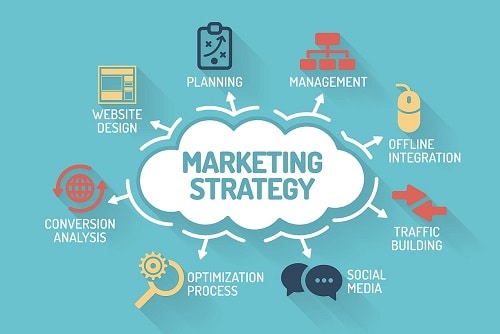Digital marketing has been revolutionized by the advent of Big Data. With the vast amounts of information generated by customers and users online, businesses now have unprecedented opportunities to refine their marketing strategies and optimize their campaigns. In this article, we will explore the ways in which Big Data is changing the face of digital marketing and the role it plays in creating successful marketing campaigns.
Introduction
In the past, businesses had limited options when it came to collecting data on their customers and target audience. Most of the data was collected through surveys, focus groups, or other traditional marketing methods. However, with the rise of digital technologies, businesses can now collect data on their customers and target audience through a variety of channels such as social media, web analytics, customer reviews, and more.
What is Big Data?
Big Data refers to the massive amount of data that is generated by people, machines, and systems every day. This data can be structured, semi-structured, or unstructured, and it can come from a variety of sources such as social media, website traffic, online purchases, mobile apps, and more. Big Data is characterized by its volume, velocity, and variety, and it requires specialized tools and techniques to analyze and extract insights from it.
How Big Data is changing digital marketing
Digital marketing has always been data-driven, but the rise of Big Data has taken it to a whole new level. Here are some ways in which Big Data is changing digital marketing:
1. Customer insights
Big Data allows businesses to gain a deeper understanding of their customers by analyzing their behavior, preferences, and interactions with the brand. This can help businesses create more personalized marketing campaigns that are tailored to the individual needs of each customer.
2. Predictive analytics
Big Data allows businesses to use predictive analytics to forecast future trends and behaviors. By analyzing patterns in customer data, businesses can predict what products and services their customers will be interested in, which channels they prefer to use, and what kind of messaging will resonate with them.
3. Real-time marketing
Big Data allows businesses to react in real-time to changes in customer behavior or market trends. By monitoring social media and other online channels, businesses can quickly identify trends and respond with targeted marketing campaigns that capitalize on those trends.
4. Improved ROI
Big Data allows businesses to track the ROI of their marketing campaigns more accurately. By analyzing the data generated by their campaigns, businesses can identify what is working and what is not, and adjust their strategies accordingly to optimize their ROI.
The benefits of using Big Data in digital marketing
Here are some of the benefits of using Big Data in digital marketing:
1. Better targeting
Big Data allows businesses to target their marketing campaigns more effectively. By analyzing customer data, businesses can create more accurate customer profiles and target their campaigns to those profiles.
2. Improved personalization
Big Data allows businesses to create more personalized marketing campaigns that are tailored to the individual needs of each customer. This can help businesses build stronger relationships with their customers and increase their loyalty to the brand.
3. Increased efficiency
Big Data allows businesses to optimize their marketing campaigns for maximum efficiency. By analyzing the data generated by their campaigns, businesses can identify what is working and what is not, and adjust their strategies accordingly to optimize their ROI.
4. Competitive advantage
Big Data allows businesses to gain a competitive advantage by staying ahead of their competitors. By using Big Data to track customer behavior and preferences, businesses can identify new market opportunities and develop innovative marketing strategies that differentiate them from their competitors.
Challenges of using Big Data in digital marketing
While Big Data offers numerous benefits to digital marketers, it also presents several challenges. Here are some of the challenges:
1. Data quality
One of the biggest challenges of using Big Data in digital marketing is ensuring data quality. With so much data available, it can be difficult to distinguish between valuable and irrelevant data. It’s essential to have robust data collection processes in place to ensure that the data collected is accurate, relevant, and usable.
2. Data privacy
Another challenge of using Big Data in digital marketing is data privacy. With the rise of data breaches and cyber threats, businesses need to be vigilant about protecting their customers’ data. It’s essential to comply with regulations such as GDPR and CCPA to ensure that customer data is collected and used ethically and legally.
3. Data integration
Big Data is often spread across multiple systems and platforms, making it challenging to integrate and analyze. It’s crucial to have a data integration strategy in place to ensure that data is collected and analyzed efficiently.
4. Skillset
Big Data analysis requires specialized skills and expertise. Businesses need to invest in training their teams or hire data analysts who have the necessary skills to extract insights from Big Data.
Conclusion
Big Data is transforming the digital marketing landscape by providing businesses with valuable insights into customer behavior, preferences, and trends. By using Big Data, businesses can create more personalized, efficient, and effective marketing campaigns that drive revenue and increase customer loyalty. However, using Big Data also presents several challenges, such as data quality, data privacy, and skillset. By overcoming these challenges, businesses can unlock the full potential of Big Data in digital marketing.
FAQs
- What is Big Data in digital marketing?
Big Data refers to the massive amount of data generated by people, machines, and systems every day. In digital marketing, businesses use Big Data to gain insights into customer behavior, preferences, and trends to create personalized, efficient, and effective marketing campaigns.
- How does Big Data benefit digital marketing?
Big Data benefits digital marketing by providing valuable insights into customer behavior, preferences, and trends. By using Big Data, businesses can create more personalized, efficient, and effective marketing campaigns that drive revenue and increase customer loyalty.
- What are the challenges of using Big Data in digital marketing?
The challenges of using Big Data in digital marketing include data quality, data privacy, data integration, and skillset. Businesses need to overcome these challenges to unlock the full potential of Big Data in digital marketing.
- How can businesses overcome the challenges of using Big Data in digital marketing?
Businesses can overcome the challenges of using Big Data in digital marketing by investing in robust data collection processes, complying with regulations, having a data integration strategy, and investing in training their teams or hiring data analysts.
- Is using Big Data in digital marketing ethical?
Using Big Data in digital marketing can be ethical if businesses comply with regulations such as GDPR and CCPA, and use customer data ethically and legally. It’s crucial to protect customers’ data privacy and ensure that the data collected is accurate, relevant, and usable.

